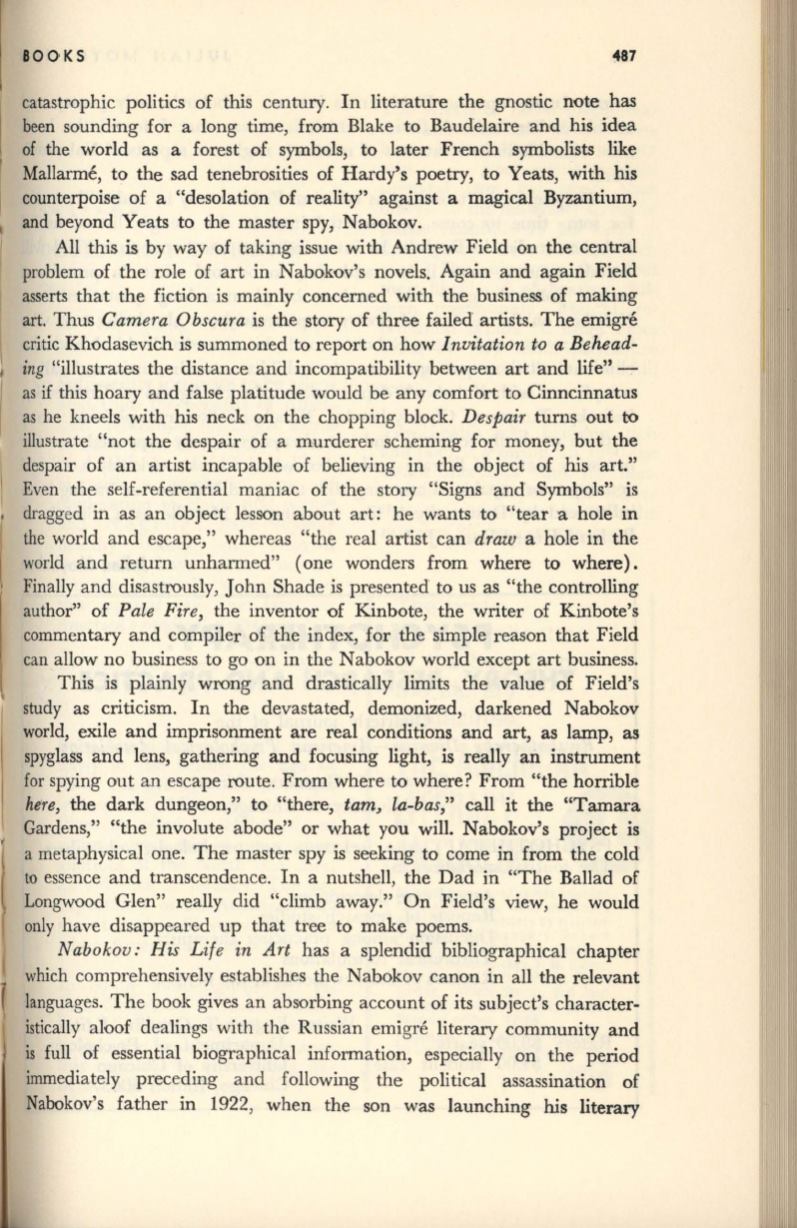
BOOKS
487
catastrophic politics of this century. In literature the gnostic note has
been sounding for a long time, from Blake to Baudelaire and his idea
of the world as a forest of symbols, to later French symbolists like
Mallarme, to the sad tenebrosities of Hardy's poetry, to Yeats, with his
counterpoise of a "desolation of reality" against a magical Byzantium,
and beyond Yeats to the master spy, Nabokov.
All this is by way of taking issue with Andrew Field on the central
problem of the role of art in Nabokov's novels. Again and again Field
asserts that the fiction is mainly concerned with the business of making
art. Thus
Camera Obscura
is the story of three failed artists. The emigre
critic Khodasevich is summoned to report on how
Invitation to a Behead-
, ing
"illustrates the distance and incompatibility between art and life" -
as if this hoary and false platitude would be any comfort to Cinncinnatus
as
he kneels with his neck on the chopping block.
Despair
turns out
to
illustrate "not the despair of a murderer scheming for money, but the
despair of an artist incapable of believing in the object of his art."
Even the self-referential maniac of the story "Signs and Symbols" is
• dragged in as an object lesson about art: he wants to "tear a hole in
the world and escape," whereas "the real artist can
draw
a hole in the
world and return unharmed" (one wonders from where to where).
Finally and disastrously, J ohn Shade is presented to us as "the controlling
author" of
Pale Fire,
the inventor of Kinbote, the writer of Kinbote's
commentary and compiler of the index, for the simple reason that Field
can allow no business to go on in the Nabokov world except art business.
This is plainly wrong and drastically limits the value of Field's
study as criticism. In the devastated, demonized, darkened Nabokov
world, exile and imprisonment are real conditions and art, as lamp, as
spyglass and lens, gathering and focusing light, is really an instrument
for spying out an escape route. From where to where? From "the horrible
here,
the dark dungeon," to "there,
tam) la-bas,"
call it the "Tamara
Gardens," "the involute abode" or what you will. Nabokov's project is
a metaphysical one. The master spy is seeking to come in from the cold
to essence and transcendence. In a nutshell, the Dad in "The Ballad of
Longwood Glen" really did "climb away." On Field's view, he would
only have disappeared up that tree to make poems.
Nabokov : His Life in Art
has a splendid bibliographical chapter
which comprehensively establishes the Nabokov canon in all the relevant
languages. The book gives an absorbing account of its subject's character–
istically aloof dealings with the Russian emigre literary community and
is full of essential biographical information, especially on the period
immediately preceding and following the political assassination of
Nabokov's father in 1922, when the son was launching his literary


